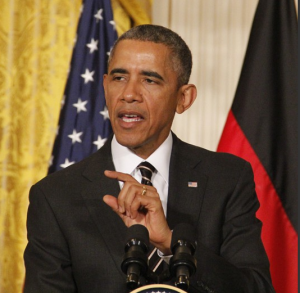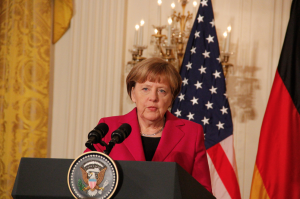WASHINGTON – President Barack Obama and German Chancellor Angela Merkel stressed the importance of continuing diplomatic efforts to resolve the situation in Ukraine, but Obama said he would consider sending lethal arms if diplomacy fails.
At a joint news conference Monday, both leaders said Russia has violated the territorial integrity of Ukraine, which has seen an increase in violence in recent weeks. The U.S and Germany are working together to pursue a diplomatic solution, they said.

President Barack Obama said if diplomacy fails, he would consider sending arms to Ukraine. (Tyler Pager/MNS)
“The possibility of lethal defensive weapons is one of those options being examined,” Obama said. “I want to emphasize that a decision has not yet been made.
Both Obama and Merkel have opposed providing lethal weapons to Ukraine and they maintained those positions Monday.
“We continue to pursue a diplomatic solution, although we have suffered a lot of setbacks,” Merkel said. “I’ve always said I don’t see a military solution to this conflict.”
The leaders are trying to force Russian President Vladimir Putin to accept a peace plan, but Obama said if diplomacy fails, all options would be considered.
“My hope is that through these diplomatic efforts, those costs have become high enough that Mr. Putin’s preferred option is for a diplomatic solution,” Obama said.

German Chancellor Angela Merkel said she is still opposed to arming Ukraine and pushed for a diplomatic approach. (Tyler Pager/MNS)
The president said there is no specific point at which he would support sending lethal weapons. Rather, he said there will be an ongoing analysis of strategy to prevent Russia from encroaching further on Ukrainian territory.
At his confirmation hearing last week, Defense Secretary nominee Ashton Carter said he would be “inclined” to providing weapons to Ukraine.
The president reiterated his goal is to not to weaken Russia, but he said the U.S. and its allies must impose a cost on Russia for its bad decisions.
“Our preference is for a strong, prosperous, vibrant, confident Russia that can be a partner with us on a whole host of global challenges,” he said.
Obama also discussed the impending March deadline for negotiations with Iran and said he would not extend the deadline any further. He said the extensions were useful in narrowing the issues and they are now at a point where a decision must be made.
He also talked about the “real difference” of opinions he has with Israeli Prime Minister Benjamin Netanyahu on Iranian negotiations. Obama said the negotiations should not be soured as they are nearing completion.
The president was also asked about his reaction to Netanyahu’s upcoming speech to a joint session of Congress in March. Netanyahu was invited to speak by Speaker of the House John Boehner, R-Ohio.
The White House said it was a “departure from protocol” and Obama said Monday he never invites foreign leaders to the White House close to their own elections. He reiterated he would not be meeting with Netanyahu.





